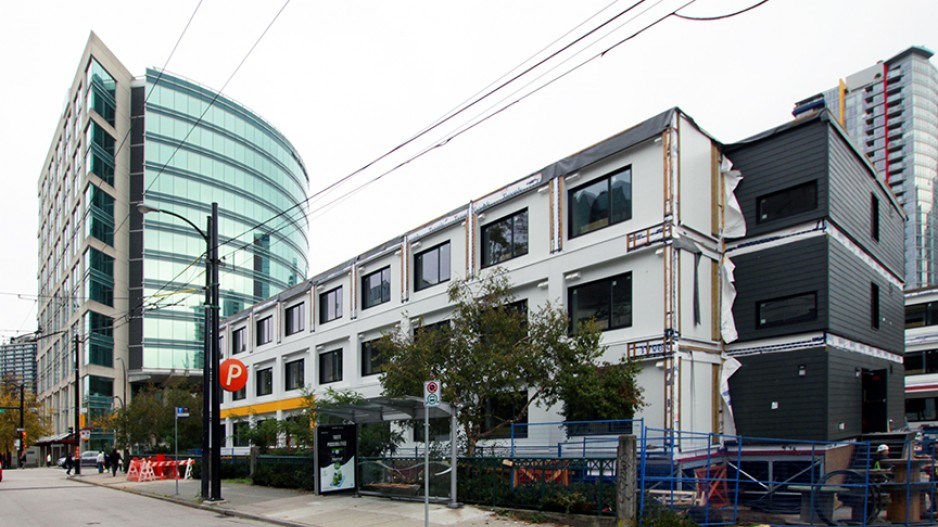Modular housing units are popping up in various unoccupied downtown Vancouver spaces, but their numbers represent only a fraction of the potential total, say industry and government professionals.
According to the province’s fall budget update, the province donated $291 million for construction of 2,000 units of modular housing for the homeless. Only 421 units in eight modular supportive-housing projects have been completed and are being occupied; five are in Vancouver and three are in Surrey.
But modular housing initiatives are facing delays in finding land and getting municipal approvals.
Education and approval are also being identified as the main barriers for increased adoption of modular developments.
“In the city of Vancouver, we are hanging around in the preconstruction phase for almost three years,” said Matt Hallaran, operations manager at Stack Modular.
Stack Modular manufactures steel modular structures. Permitting has often been a factor in delaying modular development.
Industry contenders Metric Modular and Horizon North Logistics Inc. (TSX:HNL) primarily use wood construction while Stack uses steel with the aim of building taller, multi-purpose structures. Whether they’re wood or steel, modular projects must be planned from the ground up.
“If a developer comes to us with a development permit and says, ‘Hey, we were building this conventional, but we want to take this modular,’ we have to pass on that project almost 100% of the time because it has to be designed modular from the get-go to be successful,” Hallaran said.
Last year, Bird Construction Inc. (TSX:BDT) bought 50% of Stack. The investment was motivated by trends in Europe and Asia and by Bird wanting to be one step ahead of the game, according to Hallaran. It has also accelerated project approval time.
“Being joined at the hip with a general contractor is a huge win in modular. That’s where things go wrong big time and people point fingers at each other because they are separate entities,” he said. “When we have [Bird] at the table, [the banks] accept more of our projects.”
The Vancouver Affordable Housing Agency selected Horizon North Logistics as the sole partnering company for current Vancouver-area housing projects. Horizon has a teaming agreement that allows for an expedited approval process, ensuring supply hits the market.
“We are basically turning over a building a month these days, and each building constitutes about 50 units,” said Horizon North Logistics president Joseph Kiss.
M. Mitchell Place at 2132 Ash Street is the latest modular housing structure to be erected in Metro Vancouver. Manufacturing and implementation took less than 10 months.
“We are growing, we made an acquisition in the Lower Mainland of Shelter Modular and we continue to ramp up our operations,” Kiss said.
The industry most commonly embracing the modular model is hospitality. According to Kiss, Marriott International (Nasdaq:MAR) is using modular construction with some of its brands because it results in construction times that are nearly 50% faster than those of conventional builds.
Meanwhile, the province continues to look for opportunities to expand on future projects.
“We’re successfully partnering with municipalities on these projects throughout B.C.,” said provincial government spokeswoman Esme Mills. “At times the public consultation process has proven to be challenging in some communities that are not in agreement on where a modular supportive-housing project should be located. However, in many communities across the province, local governments have played a key leadership role in moving these projects forward.”




